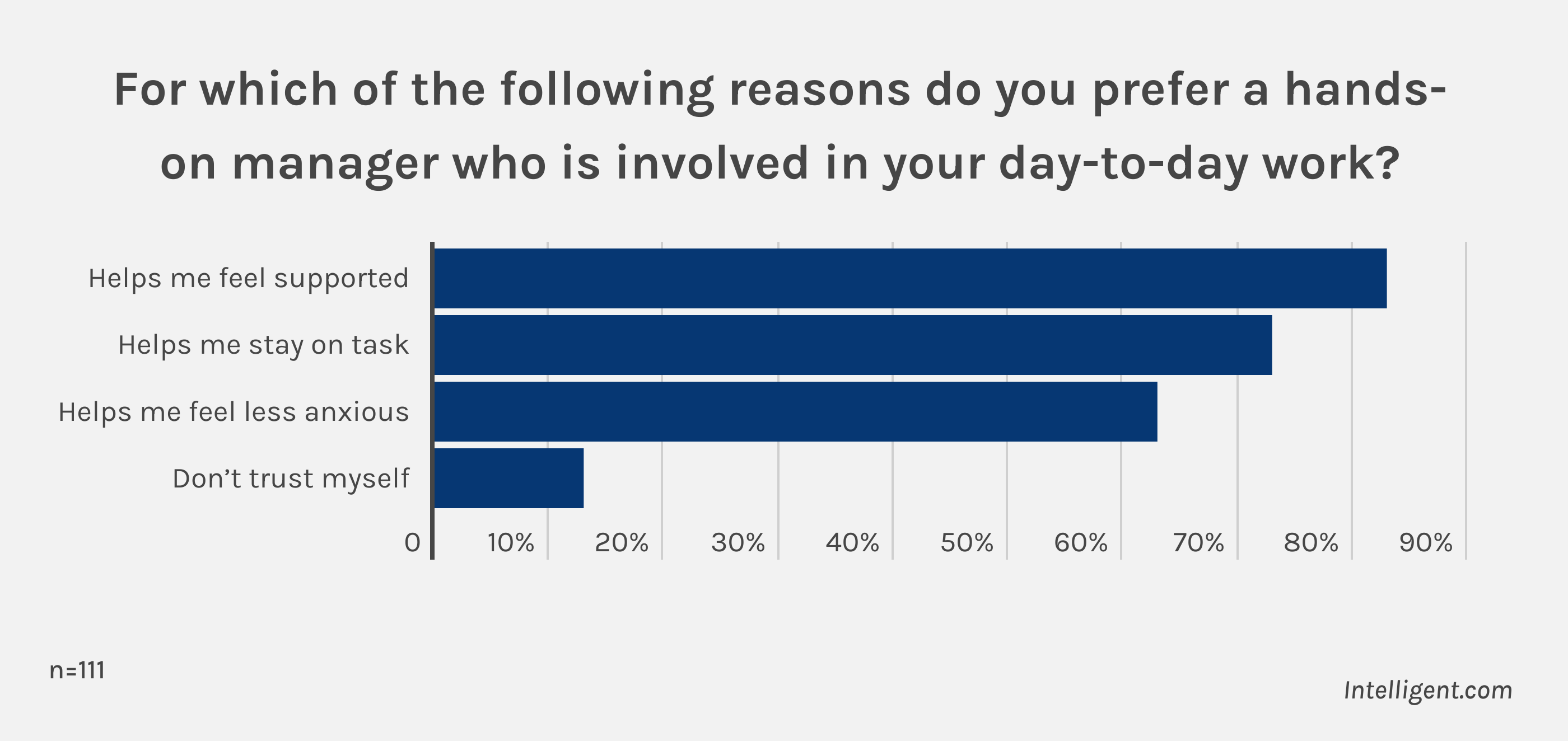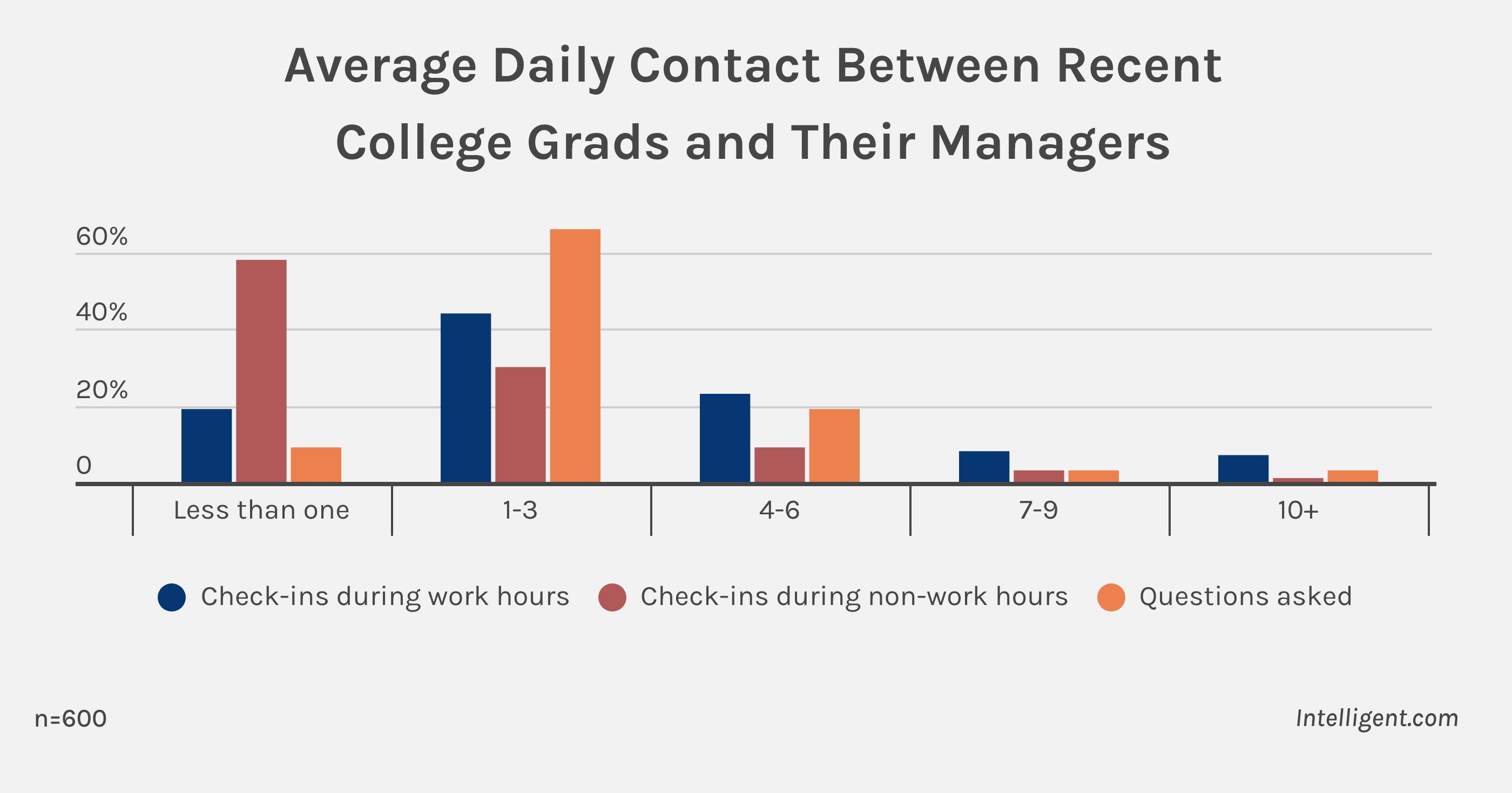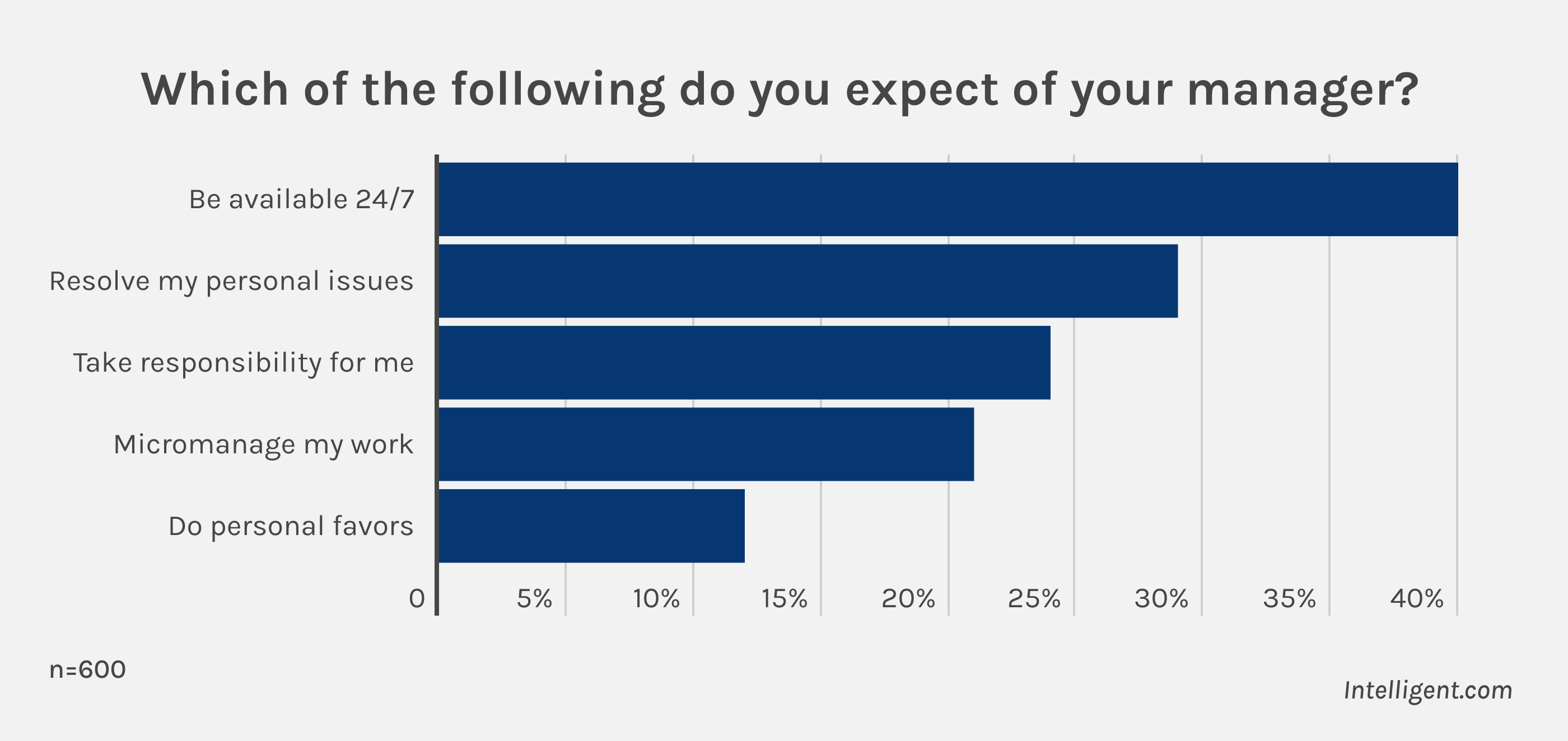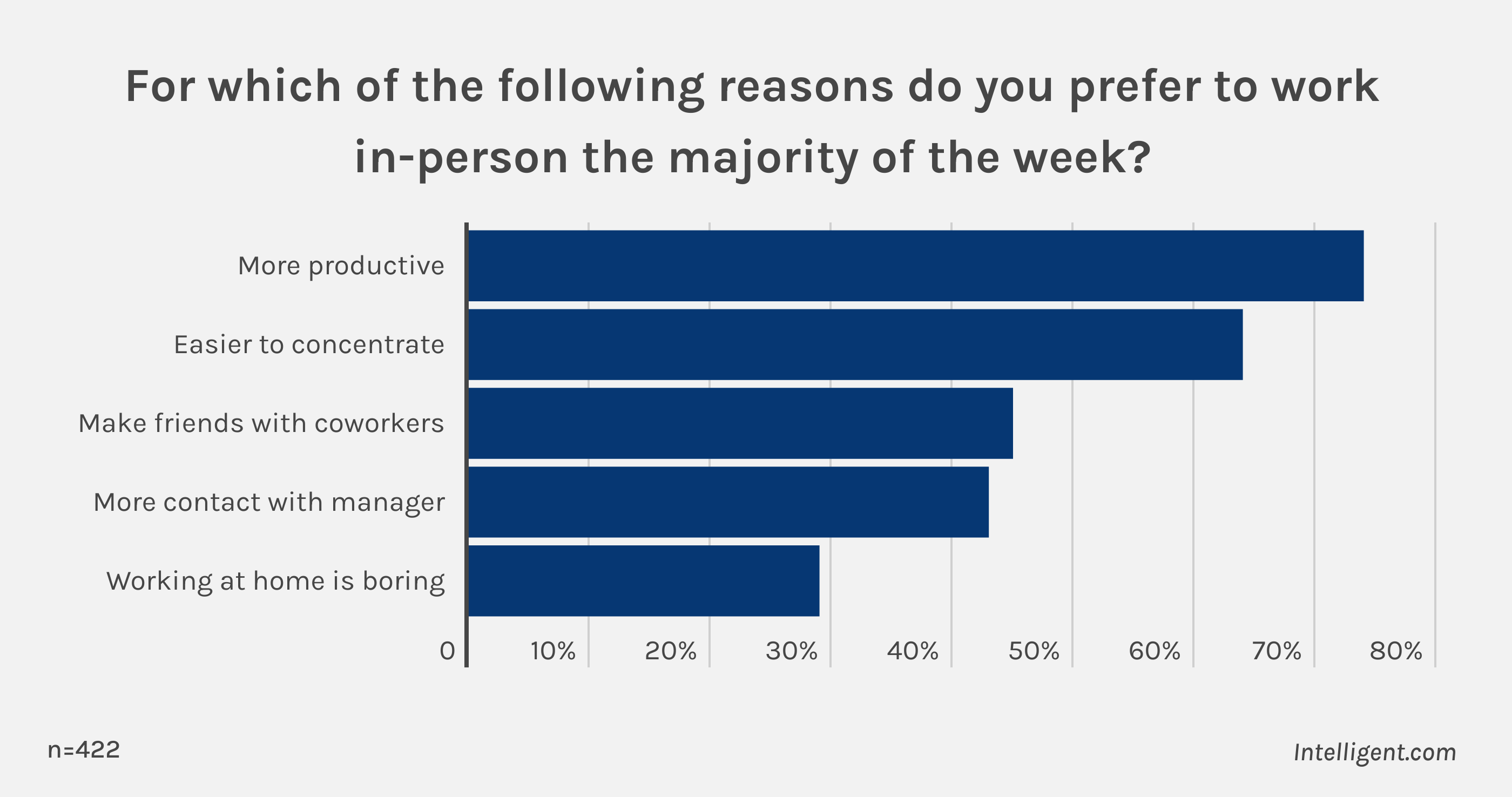Recent college grads have a reputation for acting entitled and having a poor work ethic in the workplace. We wanted to find out how this translates to their relationships with their managers. In August, Intelligent.com surveyed 600 recent college graduates employed in an office setting to learn more about their work habits and preferred management styles.
What we found:
- 1 in 5 recent grads prefer to be micromanaged
- 4 in 10 check in with their manager 4+ times per day
- 4 in 10 feel anxious most workdays
- 40% expect their managers to be available 24/7
- 9 in 10 want to work in-person vs. remotely
19% of Recent Graduates Prefer to Be Micromanaged
When respondents were asked how they prefer to be managed, 19% said they like a manager who is hands-on and involved in their day-to-day work life. Twenty-five percent prefer a hands-off, distant management style, and 57% would opt for a balanced approach between the two.
Among those who say they want a hands-on management approach, 83% say this style helps them feel more supported at work, 73% say it helps them stay on task, 63% say it helps them feel less anxious, and 13% say they don’t trust themselves to do a good job on their own.
Forty-six percent of all respondents also say they choose to use a personal daily task tracker for their own purposes. Twenty-three percent say they have a daily task tracker that they have to work through with their manager, and 31% do not use a task tracker.
“The large percentage of recent grads who prefer to be micromanaged could be a result of several factors,” says Huy Nguyen, chief education and career development advisor at Intelligent. “It’s likely that many had limited real-world work experience while they were attending school, so they do not have the familiarity or confidence to transition to a more autonomous environment.
“In school, they received clear instructions, frequent feedback, and knew their complete path to graduate successfully,” Nguyen continues. “As they enter the workplace, their path to success is less clear to them, and they may be scared to make mistakes and have anxiety to perform perfectly on their first job. Their reliance on managerial supervision and validation can be seen as a way to cope with early career challenges before developing more confidence which comes with experience.”

Nearly 4 in 10 Recent Grads Check In With Their Manager 4+ Times Per Day
Respondents were asked to estimate, on average, the number of times they “check-in” (defined as an email, phone call, video call, instant message, meeting, etc.) with their manager each day. Twenty-three percent say they check in with their manager four to six times per day, 8% check in seven to nine times per day, and 7% check in 10 or more times per day.
The largest group, at 44%, say they check in with their manager an average of one to three times per day, 16% check in less than once per day, and 3% say they never check in with their manager.
Forty-three percent of respondents also say they check in with their manager during non-work hours at least once per day. On average, one in four respondents estimate they ask their manager four or more questions per day, while one in five say they have one-on-one meetings with their manager multiple times per week.

1 in 6 Recent Graduates Feel Anxious Daily At Work; Use Manager as Safety Blanket
Sixteen percent of recent grads surveyed say they feel anxious about work five or more days per week, while 27% say they feel work anxiety three to four days per week, 40% feel anxious one to two days per week, and only 17% don’t feel anxious at all about work.
Given the high levels of reported work anxiety, it makes sense that recent grads report contacting their managers so frequently. Fifty-seven percent say receiving feedback from their manager makes them feel supported, 51% feel motivated and encouraged, and 45% feel confident.
Many employees in this age group seem to feel especially attached to their managers, as 40% say they expect their managers to be available 24/7 for any inquiries or issues. Additionally, 29% expect their managers to resolve all personal issues affecting their work, and 24% expect their managers to take responsibility for respondents’ shortcomings.
“This finding is likely due to a combination of both being new to the workforce and some generational characteristics to consider,” comments Nguyen. “It’s natural for new grads entering the workforce for the first time to build a reliance on their managers to seek guidance and reassurance as they navigate an unfamiliar environment and attempt to understand workplace dynamics.
“In addition to just being uncomfortable in a new setting, there may also be a generational trend. Gen Z, who have grown up as digital natives, consuming content and being connected to everything at all times, may be accustomed to instant feedback and responses. They may carry this expectation to the workplace.
“While these factors can help explain some of these observations, it’s important to not overgeneralize and consider that attachment to managers can vary greatly from one individual to another, depending on their personality, job responsibilities, and the company culture,” explains Nguyen.

9 in 10 Recent Graduates Want to Be In-Office At Least Once Per Week
The vast majority of respondents (88%) say they would prefer to work in person at least one day per week, and 28% even say they’d prefer to work in person full-time.
For those who want to work in person most of the week, the top reasons why include that it makes them more productive (74%), it’s easier to concentrate (64%), to make friends with coworkers (45%), and to have more contact with their manager (43%).
“Many Gen Z workers are just starting their careers so they are eager to experience the dynamics of the workplace and learn through observing and collaborating with their coworkers,” explains Nguyen. “There may also be a perception that being in the office with their managers, or others higher up in the organization, makes them more visible and proves they are working hard.
“The in-person work environment can also be easier for informal networking, building professional relationships, and indirect learning from being around others who may be working in other areas of the company. For many in this generation, the workplace can also be a good place for social interaction and building friendships,” Nguyen says.

Methodology
This online poll was commissioned by Intelligent.com and conducted on Pollfish in August 2024. In total, 600 recent college graduates completed the survey. Demographic criteria were used to ensure qualified respondents. This criteria included age (21-25), employment status (employed for wages), and level of education (university or vocational/technical college degree). Respondents were also screened to only include those who work in an office-type environment.